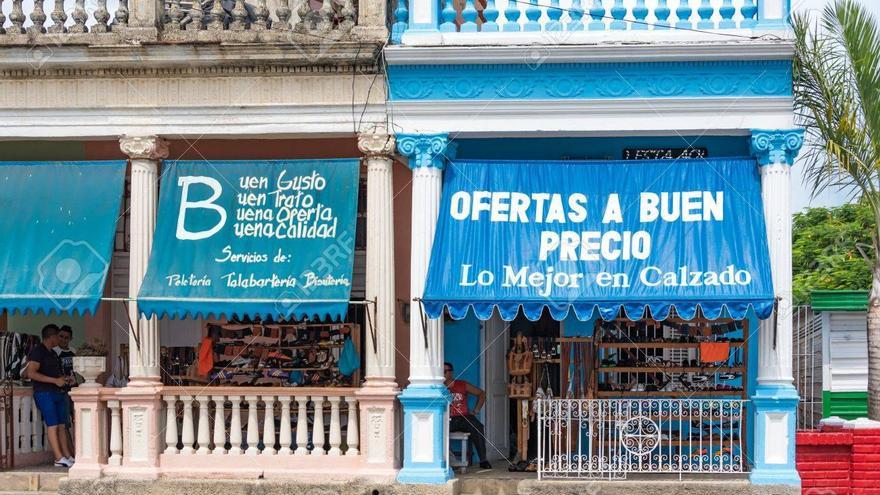
![]() 14ymedio, Madrid, September 1, 2021 — The ministers of the Government’s economic area, led by Vice Prime Minister Alejandro Gil, appeared on the Mesa Redonda (Roundtable) television program on Tuesday, presumably to give the “Necessary answers regarding the actors of the Cuban economy.” Although little news came out of this tedious exercise, there was time to finish the program by denying that the approval of the MSMEs [micro, small, and medium-size enterprises] could mean a return to capitalism which, as they argued, is not what the people want.
14ymedio, Madrid, September 1, 2021 — The ministers of the Government’s economic area, led by Vice Prime Minister Alejandro Gil, appeared on the Mesa Redonda (Roundtable) television program on Tuesday, presumably to give the “Necessary answers regarding the actors of the Cuban economy.” Although little news came out of this tedious exercise, there was time to finish the program by denying that the approval of the MSMEs [micro, small, and medium-size enterprises] could mean a return to capitalism which, as they argued, is not what the people want.
Gil contended that the approval of the norms that regulate non-agricultural cooperatives and micro, small and medium-sized enterprises, which comes into force on September 20, is nothing more than an improvement and modernization of socialist principles. “We do not want a capitalist and neoliberal style project,” he argued, despite the fact that the Cuban economy is increasingly on the path to a ruthless state capitalism.
“We are going to achieve a country with greater coherence, where people can develop their life project. This is more socialism and more Revolution,” Gil claimed in a kind of final argument.
Along the same line, the ministers had already referred to the impossibility of having more than one company per person, a rule that is based on the constitutional (socialist) principle of avoiding the concentration of property and wealth. Nor, for the same reason, can one company be a partner of another. “It would be laughable if successive MSMEs were set up where the owner was always the same person. If this happened, it would be in a way breaking the rule,” they warned. Of course, they pointed out that the company’s corporate purpose can be so broad that it includes multiple services.
The ministers went over the most frequent doubts that have circulated since the legislative content became known, but the answers did not clarify much, when all they did was limit themselves to repeating what was already known.
For example, they insisted on pointing out what they have considered priority sectors for the first phase — which will be food production, technology-based companies related to additive manufacturing, robotics or the creation of new materials or establishing technology parks, local development projects — without explaining how they plan to manage, right off the bat, such a radical change in the country’s productive fabric.
The Minister of Economy also referred to the possibility of foreigners investing and, in that sense, recalled that the rule is the same as for the state-owned company: only a company that is set up as a mixed-ownership company may be formed with capital from a resident in Cuba and another abroad. But according to the Foreign Investment Law (2014), a “mixed company” is a “commercial company that takes the form of a corporation,” something that is prohibited to individuals and reserved to the State.
Nor does it change anything with respect to exports and imports, which can be done as long as they are channeled through a state company, and they are “prohibited” for professions, such as architects, lawyers, engineers, teachers, journalists or veterinarians.
Gil argued that professionals can work in the private sector, but cannot create a company dedicated exclusively to an activity that is not allowed, so that, based on their statements, a lawyer, for example, could offer legal services to a company, but could not represent it in court.
“There are a range of malicious opinions that say that if you are a professional you cannot work in a MSME or that if you work in one you have to develop an activity for which you are not qualified. This is not the case. . . . What is not allowed are activities that are dedicated only to professional services. Computer scientists, the pet veterinarian, the bookkeeper for accounting activities are allowed.” A short and very restrictive list.
The Minister of Labor and Social Security took on one of the questions that will remain to be answered later. Maria Elena Feito Cabrera gave assurance that the salary of workers in private companies may be decided by employers with the participation of workers through a collective agreement and with the participation of unions. But she did not specify whether there could be unions other than the official ones and whether employees could form their own collectives to look out for their interests.
The worst of last night’s news came from the Central Bank of Cuba, which affirmed that companies will be able to request loans in Cuban pesos, but not in foreign exchange, though in all probability they will have to buy a multitude of raw materials and supplies in the international market.
“To grant financing in that currency [freely convertible] we would have to have individuals involved who have income in that currency and the capacity to repay the financing, hence the possibility of withholding money for exports, or liquidity for sales to Mariel [Port of Mariel Special Development Zone], or for sale in MLC [Freely Convertible Foreign Currency] stores,” he explained.
Translated by Tomás A.
____________
COLLABORATE WITH OUR WORK: The 14ymedio team is committed to practicing serious journalism that reflects Cuba’s reality in all its depth. Thank you for joining us on this long journey. We invite you to continue supporting us by becoming a member of 14ymedio now. Together we can continue transforming journalism in Cuba.
